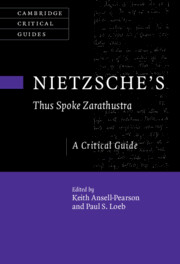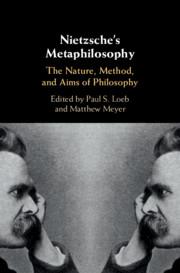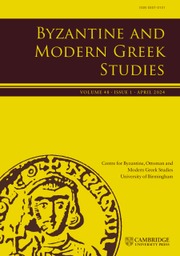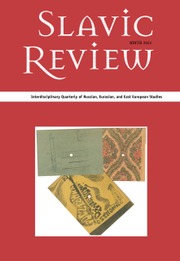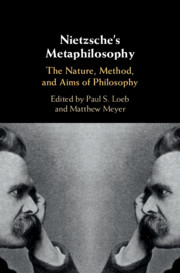The Death of Nietzsche's Zarathustra
- Author: Paul S. Loeb, University of Puget Sound, Washington
- Date Published: April 2010
- availability: Available
- format: Hardback
- isbn: 9780521519236
Hardback
Other available formats:
Paperback, eBook
Looking for an inspection copy?
Please email [email protected] to enquire about an inspection copy of this book
-
In this study of Nietzsche's Thus Spoke Zarathustra, Paul S. Loeb proposes a fresh account of the relation between the book's literary and philosophical aspects and argues that the book's narrative is designed to embody and exhibit the truth of eternal recurrence. Loeb shows how Nietzsche constructed a unified and complete plot in which the protagonist dies, experiences a deathbed revelation of his endlessly repeating life, and then returns to his identical life so as to recollect this revelation and gain a power over time that advances him beyond the human. Through close textual analysis and careful attention to Nietzsche's use of Platonic, biblical, and Wagnerian themes, Loeb explains how this novel design is the key to solving the many riddles of Thus Spoke Zarathustra - including its controversial fourth part, its obscure concept of the Übermensch, and its relation to Nietzsche's Genealogy of Morals.
Read more- Provides a new reading of Nietzsche's famous clue that the doctrine of eternal recurrence is Zarathustra's fundamental thought
- Emphasises the performative aspect of Zarathustra, linking it to Nietzsche's description of the book as a kind of drama akin to Wagner's operas
- Takes into consideration every major interpretation of Thus Spoke Zarathustra and of eternal recurrence written to date
Reviews & endorsements
'It is difficult to overstate the magnitude of the challenge this book poses to the standard and currently authoritative interpretations of Thus Spoke Zarathustra. Paul Loeb's careful exegesis and persuasive argumentation will oblige most of the leading Nietzsche scholars working today to revisit - and, in many cases, to revise - their interpretations accordingly. An impressive achievement by any measure.' Daniel Conway, Texas A&M University
See more reviews'This is a provocative, novel, and erudite attempt to thread a philosophical path through the enigmatic and labyrinthine work that Nietzsche consistently considered to be his masterpiece. Paul S. Loeb establishes one of the strongest readings yet of Thus Spoke Zarathustra, arguing in a spirited, polemical, and rigorous manner that Zarathustra's story interweaves narrative and concept to develop a startling idea of post-human temporality. Readers will find here new and powerful views of Nietzsche's thoughts of eternal recurrence and the Übermensch, and suggestions of how these illuminate the program of overcoming ressentiment in his Genealogy of Morals.' Gary Shapiro, University of Richmond
'In this careful, innovative, and nuanced study, Loeb … develops an alternative to standard doctrinal and ironist readings of Nietzsche's Thus Spoke Zarathustra by revealing how its literary structure expresses the philosophical significance of the otherwise enigmatic teaching of the eternal return of the same … Highly recommended …' E. S. Nelson, Choice
'Paul Loeb's The Death of Nietzsche's Zarathustra is a superb contribution to the philosophical scholarship on Nietzsche's notoriously most inaccessible book, Thus Spoke Zarathustra … Loeb's book presents an ingeniously argued and richly insightful interpretation of Nietzsche's literary fiction that pointedly and often persuasively takes issue with each of the major TSZ commentaries to have been published within the last twenty-five years or so … an immediately indispensable and, again, excellent contribution to the literature on TSZ …' Robert Gooding-Williams, Notre Dame Philosophical Reviews
'Because the Genealogy [of Morals] is widely taken to be Nietzsche's most important work, Loeb's attempt to resolve its paradoxes by reference to the doctrines of Zarathustra is both important and timely … This book includes … a final chapter that promises to provide several thesis topics for graduate students interested in Nietzsche's moral thought.' Bryan Finken, Philosophy in Review
'Loeb's book is much bolder and potentially more compelling than the great commentaries, because its boldness rests solidly on the boldness of Nietzsche himself - this is the most literal reading of Nietzsche's masterpiece to date, literal in the sense that it dares to take Nietzsche at his word where others have ascribed metaphoricity and other rhetorical functions to him.' Adrian Del Caro, The Journal of Nietzsche Studies
'This book constitutes an 'event' in Nietzsche studies and is one of the most important books published in recent years on Nietzsche in the English-speaking world. It is both scholarly and immensely challenging.' Keith Ansell Pearson, University of Warwick
Customer reviews
Not yet reviewed
Be the first to review
Review was not posted due to profanity
×Product details
- Date Published: April 2010
- format: Hardback
- isbn: 9780521519236
- length: 284 pages
- dimensions: 235 x 161 x 20 mm
- weight: 0.6kg
- availability: Available
Table of Contents
Preface
Texts and citations
Introduction: the clue to the riddles
1. The eternal recurrence of the same
2. Demon or god?
3. The dwarf and the gateway
4. The great noon
5. The laughing lions
6. The shepherd and the serpent
7. Circulus vitiosus deus
8. Post-Zarathustra
Bibliography
Index.
Sorry, this resource is locked
Please register or sign in to request access. If you are having problems accessing these resources please email [email protected]
Register Sign in» Proceed
You are now leaving the Cambridge University Press website. Your eBook purchase and download will be completed by our partner www.ebooks.com. Please see the permission section of the www.ebooks.com catalogue page for details of the print & copy limits on our eBooks.
Continue ×Are you sure you want to delete your account?
This cannot be undone.
Thank you for your feedback which will help us improve our service.
If you requested a response, we will make sure to get back to you shortly.
×

